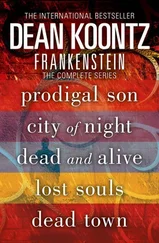The port-wine birthmark appeared to be darker than before and differently mottled than he remembered it.
If the policeman's gray eyes had earlier been as hard as nailheads, they were now points, and behind them was willpower strong enough to drive spikes through stone.
“My God,” Junior said, pretending that his befuddlement had faded and that his mind had just now clarified, “you think Naomi was murdered, don't you?"
Instead of engaging in the confrontation for which he had been pressing ever since his first visit, Vanadium surprised Junior by breaking eye contact, turning from the bed, and crossing the room to the door.
“It's even worse,” Junior rasped, convinced that he was losing some indefinable advantage if the cop left without playing out this moment as it would usually unfold in an intellectual television crime drama like Perry Mason or Peter Gunn.
Stopping at the door without opening it, Vanadium turned to stare at Junior, but said nothing.
Leavening his tortured voice as best he could with shock and hurt, as though deeply wounded by the need to speak these words, Junior Cain said, “You ... you think I killed her, don't you? That's crazy."
The detective raised both hands, palms toward Junior, fingers spread.
After a pause, he showed the backs of his hands-and then the palms once more.
For a moment, Junior was mystified. Vanadium's movements had the quality of ritual, vaguely reminiscent of a priest raising high the Eucharist.
Mystification slowly gave way to understanding. The quarter was gone.
Junior hadn't noticed when the detective stopped turning the coin across his knuckles.
“Perhaps you could pull it from your ear,” Thomas Vanadium suggested.
Junior actually raised his trembling left hand to his ear, expecting to find the quarter tucked in the auditory canal, held between the tragus and the antitragus, waiting to be plucked with a flourish.
His ear was empty.
“Wrong hand,” Vanadium advised.
Strapped to the bracing board, semi-immobilized to prevent the accidental dislodgement of the intravenous feed, Junior's right arm felt half numb, stiff from disuse.
The supplicant hand seemed not to be a part of him. As pale and exotic as a sea anemone, the long fingers curled as tentacles curl artfully around an anemone's mouth, poised to snare, lazily but relentlessly, any passing prize.
Like a disc fish with silvery scales, the coin lay in the cup of Junior's palm. Directly over his life line.
Disbelieving his eyes, Junior reached across his body with his left hand and picked up the quarter. Although it had been lying in his right palm, it was cold. Icy.
Miracles being nonexistent, the materialization of the quarter in his hand was nevertheless impossible. Vanadium had stood only at the left side of the bed. He had never leaned over Junior or reached across him.
Yet the coin was as real as dead Naomi broken on the stony ridge at the foot of the fire tower.
In a state of wonderment that was laced with dread rather than delight, he looked up from the quarter, seeking an explanation from Vanadium, expecting to see that anaconda smile.
The door was falling shut. With no more sound than the day makes when it turns to night, the detective had gone.
SERAPHIM AETHIONEMA WHITE was nothing whatsoever like her name, except that she had as kind a heart and as good a soul as any among the hosts in Heaven. She did not have wings, as did the angels after which she had been named, and she couldn't sing as sweetly as the seraphim, either, for she had been blessed with a throaty voice and far too much humility to be a performer. Aethionema were delicate flowers, either pale-or rose-pink, and while this girl, just sixteen, was beautiful by any standard, she was not a delicate soul but a strong one, not likely to be shaken apart in even the highest wind.
Those who had just met her and those who were overly charmed by eccentricity called her Seraphim, her name complete. Her teachers, neighbors, and casual acquaintances called her Sera. Those who knew her best and loved her the most deeply—like her sister, Celestina called her Phimie.
From the moment the girl was admitted on the evening of January 5, the nurses at St. Mary's Hospital in San Francisco called her Phimie, too, not because they knew her well enough to love her, but because that was the name they heard Celestina use.
Phimie shared Room 724 with an eighty-six-year-old woman Nella Lombardi-who had been deep in a stroke-induced coma for eight days and who had been recently moved out of the ICU when her condition stabilized. Her white hair was radiant, but the face that it framed was as gray as pumice, her skin utterly without luster.
Mrs. Lombardi had no visitors. She was alone in the world, her two children and her husband having passed away long ago.
During the following day, January 6, as Phimie was wheeled around the hospital for tests in various departments, Celestina remained in 724, working on her portfolio for a class in advanced portraiture. She was a Junior at the Academy of Art College.
She had put aside a half-finished pencil portrait of Phimie to develop several of Nella Lombardi.
In spite of the ravages of illness and age, beauty remained in the old woman's face. Her bone structure was superb. In youth, she must have been stunning.
Celestina intended to capture Nella as she was now, head at rest upon the pillow of, perhaps, her deathbed, eyes closed and mouth slack, face ashen but serene. Then she would draw four more portraits, using bone structure and other physiological evidence to imagine how the woman had looked at sixty, forty, twenty, and ten.
Ordinarily, when Celestina was troubled, her art was a perfect sanctuary from all woes. When she was planning, composing, and rendering, time had no meaning for her, and life had no sting.
On this momentous day, however, drawing provided no solace. Frequently, her hands shook, and she could not control the pencil.
During those spells when she was too shaky to draw, she stood at the window, gazing at the storied city.
The singular beauty of San Francisco and the exquisite patina of its colorful history spoke to her heart and kindled in her such an unreasonable passion that she sometimes wondered, at least half seriously, if she had spent other lives here. Often, streets were wondrously familiar to her the first time that she set foot on them. Certain great houses, dating from the late 1800s and early 1900s, inspired her to imagine elegant parties thrown there in more genteel and gilded ages, and her flights of imagination sometimes acquired such vivid detail that they were eerily like memories.
This time, even San Francisco, under a Chinese-blue sky stippled with a cloisonne of silver-and-gold clouds, couldn't provide solace or calm Celestina's nerves. Her sister's dilemma wasn't as easily put out of mind as any problem of her own might have been-and she herself had never been in such an awful situation as Phimie was now.
Nine months ago, Phimie had been raped.
Ashamed and scared, she told no one. Although a victim, she blamed herself, and the prospect of being exposed to ridicule so horrified her that despair got the better of good judgment.
When she discovered she was pregnant, Phimie dealt with this new trauma as other naive fifteen-year-olds had done before her: She sought to avoid the scorn and the reproach that she imagined would be heaped upon her for having failed to reveal the rape at the time it occurred. With no serious thought to long-term consequences, focused solely on the looming moment, in a state of denial, she made plans to conceal her condition as long as possible.
In her campaign to keep her weight gain to a minimum, anorexia was her ally. She learned to find pleasure in hunger pangs.
Читать дальше











